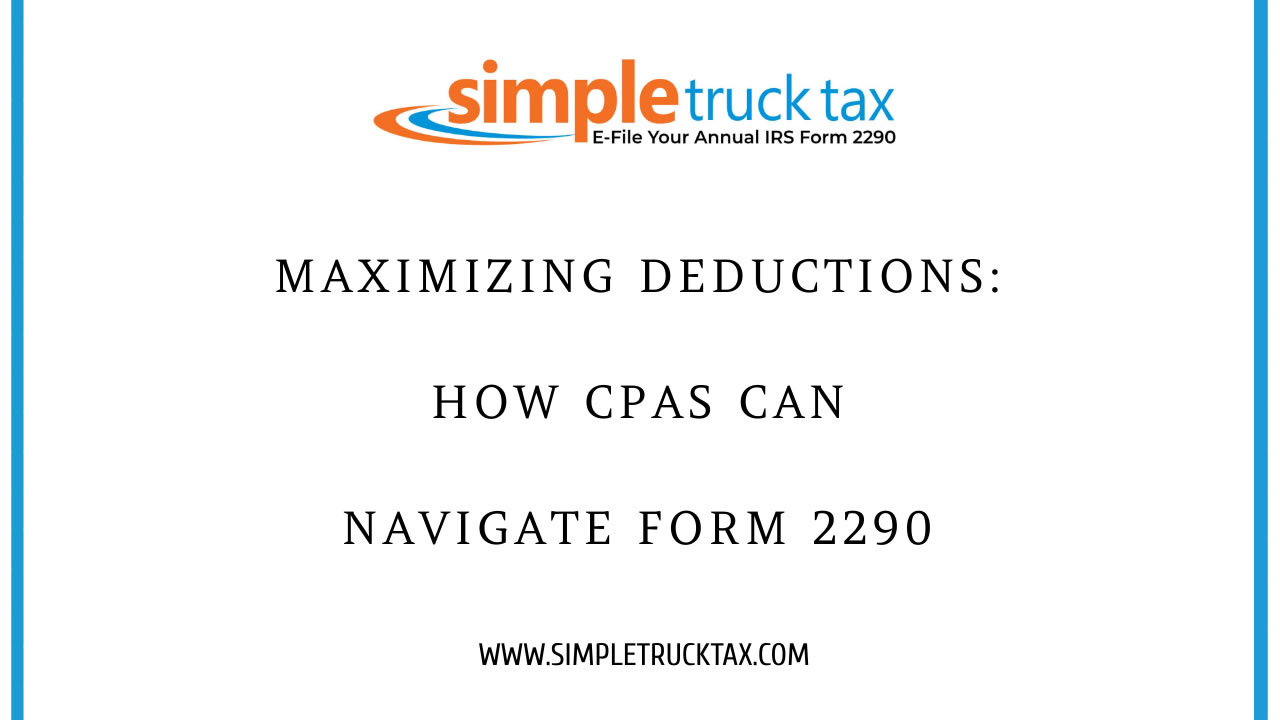
Maximizing Deductions: How CPAs Can Navigate Form 2290
As a Certified Public Accountant (CPA), you understand the importance of providing accurate and comprehensive tax guidance to your clients. One area that can be particularly challenging to navigate is Form 2290, the Heavy Highway Vehicle Use Tax Return. This form is used to report and pay the annual federal vehicle use tax, which applies to heavy vehicles with a gross weight of 55,000 pounds or more. We will explore some strategies that CPAs can use to help their clients maximize deductions and effectively navigate this complex tax form.
Understanding Form 2290 and its Deductible Expenses
Before diving into the strategies to maximize deductions on Form 2290, it is crucial to have a solid understanding of the form and the deductible expenses associated with it. As a CPA, you must be well-versed in the IRS regulations surrounding this tax return in order to guide your clients effectively.
Form 2290 allows for deductions of certain expenses related to heavy vehicles. These deductions include:
1. Actual Expenses:
Clients can deduct the actual expenses incurred in operating the heavy vehicle, such as fuel costs, repairs, and maintenance.
2. Mileage Rate:
The IRS provides a standard mileage rate that can be used to calculate the deductible expenses. As of 2021, the mileage rate is $0.16 per mile for vehicles with a gross weight of 55,000 pounds or more.
3. Qualified Business Use:
If the heavy vehicle is used for qualified business purposes, clients can deduct expenses related to its operation. However, personal use expenses are not deductible.
4. State License Fees:
Clients can deduct state license fees paid for their heavy vehicles.
Maximizing Deductions on Form 2290: Strategies for CPAs
Now that we have a clear understanding of the deductible expenses, let's explore some strategies that CPAs can employ to help their clients maximize deductions on Form 2290.
1. Accurate Record-Keeping:
Encourage your clients to maintain accurate and detailed records of all expenses related to their heavy vehicles. This includes keeping track of fuel costs, repairs, maintenance, and any other expenses incurred during the tax year. By having a complete record of expenses, clients can claim the maximum deductions allowed by the IRS.
2. Separate Personal and Business Expenses:
It is crucial for clients to separate personal and business expenses related to their heavy vehicles. Personal use expenses are not deductible, so it is important to clearly identify and exclude them when calculating deductible expenses.
3. Utilize the Actual Expense Method:
Depending on your client's situation, it may be more beneficial to use the actual expense method rather than the standard mileage rate. This allows clients to deduct the actual expenses incurred, which can sometimes result in a higher deduction. As a CPA, it is your role to analyze your client's financials and determine the most advantageous method for them.
4. Stay Updated on IRS Regulations:
Tax laws and regulations are constantly changing. It is essential for CPAs to stay updated on any updates or changes to Form 2290 and its deductions. This ensures that clients receive the most accurate and up-to-date tax advice. Form 2290 can be a complex tax form, but with the right strategies and guidance, CPAs can help their clients maximize deductions effectively. By understanding the deductible expenses, encouraging accurate record-keeping, separating personal and business expenses, and staying updated on IRS regulations, CPAs can navigate Form 2290 confidently and provide valuable tax advice to their clients.
Note: For more information, visit IRS website